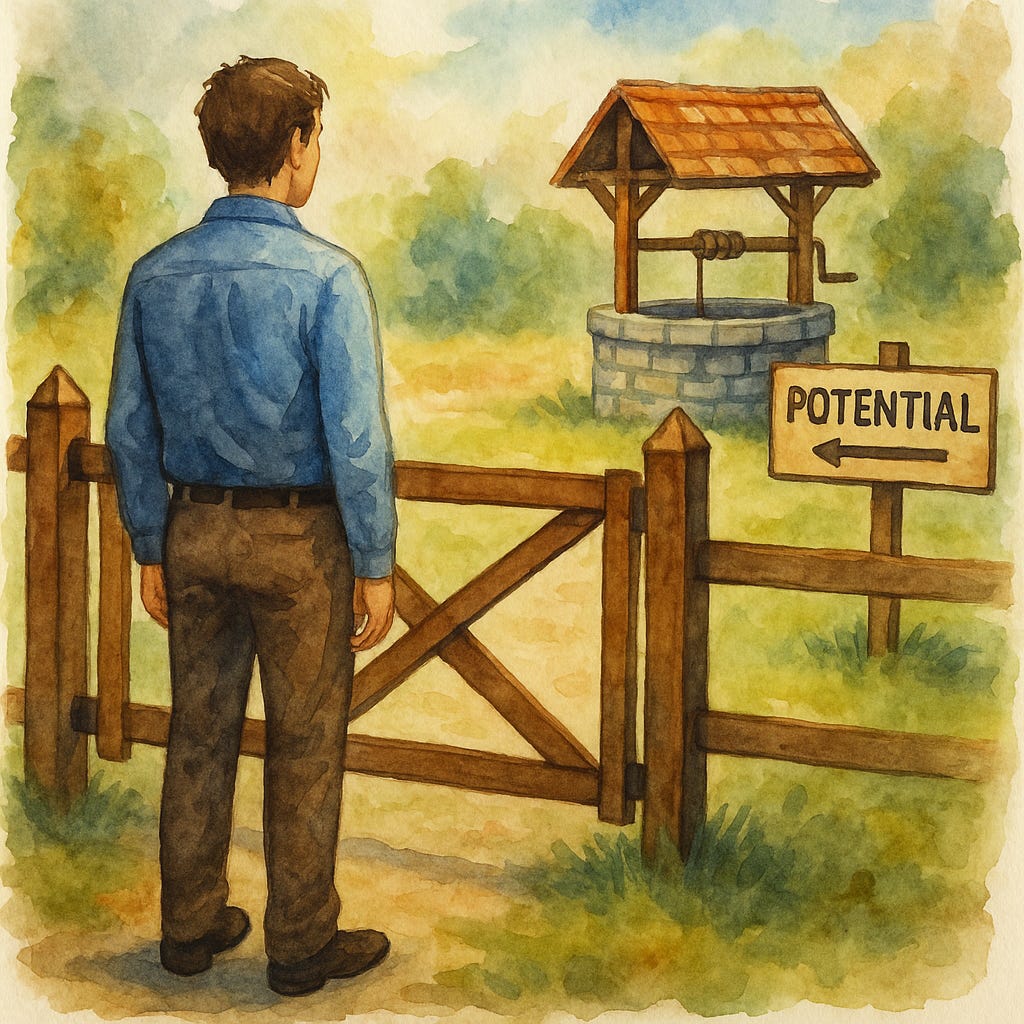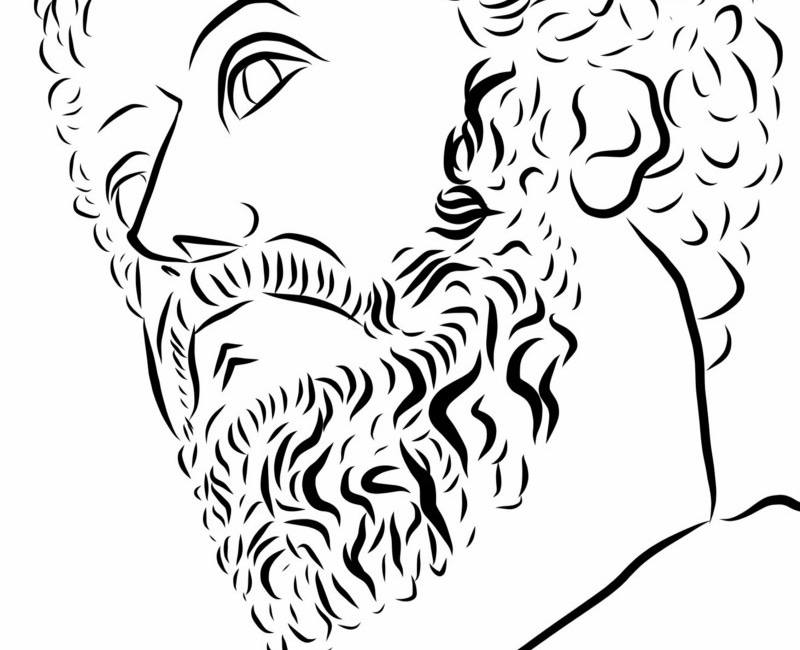The Roadblocks to Our Potential
And ways to overcome them in order to fulfill our desires
Mind Candy is a newsletter on practical philosophy and human flourishment—aka how to live “the good life.” Each month we tackle a new theme.
This month we’re exploring the theme of Potential.
“Our deepest fear is not that we are inadequate. Our deepest fear is that we are powerful beyond measure.”
Each of us has potential specific to ourselves yet we allow so many things to get in the way of us uncovering what we’re truly capable of.
Sometimes it’s due to limiting beliefs such as fear, other times it’s comparing ourselves to others.
Below are four roadblocks we are prone to and ways to combat each in an effort to achieve our true potential.
Lack of Routine
“Habit seems to work from the outside in; from behavior to personality.”
We are what we repeatedly do. If we haven’t formed routines or behaviors (aka habits) that funnel our time and energy into a direction that benefits our potential and goals, then we’ll never achieve them.
We may start out unsure of where to begin. We may question if we have it in us to take the journey. We may lack confidence.
But this all changes with action.
Think about someone who starts going to the gym to get in shape. At first, it is painful, it’s awkward as they may not know what to do, we question why we’re subjecting ourselves to such punishment in the first place.
But gradually, the pain subsides and we begin to feel good. It reinforces the work we’re putting in. Then we begin to see tangible results. We lose some weight, or we get faster, or see some muscle growth. This further reinforces the notion that what we’re doing is paying off. And because we now have these tangible results, we are able to have proof for our mind that this is worth it, and we double down and are in.
Our pursuits of our potential is no different.
When we take action, regardless of how it feels at first, we’re making forward progress in uncovering what we’re made of, what we are capable of.
This is our resume, this is what we must turn back to every day for inspiration—the proof that we’ve taken action—are taking action—and slowly improving.
Potential is never uncovered in some giant act, it is found through the daily actions taken to get better.
As James Clear succinctly put it, “Habits are the compound interest of self-improvement.”
Try and get better 1% each day and the results will speak for themselves within a month.
Comparison
“Basic needs met, attention turns to the game, to the contest for rank or status, and so how one is scored by the game's score keeping, whether in accolades, smarts, riches, or looking hot and sexy (and reaping the benefits).”
Comparison is a thief of joy, but it is also natural human trait. We want to see where we are versus others. It’s a status game to an extent.
But it leads to us missing out on valuable time and energy devoted to what needs to get done.
We must instead focus on ourselves and what we have to offer, not what others do. We do this through purpose.
“Purpose provides activation energy for living,” the psychologist Mihaly Csikszentmihalyi once said.
We need purpose, something to aim at, to bring forth our potential. It is through this that we counteract comparison.
Confucius used the analogy of the archer:
“In archery we have something resembling the way of the excellent person. When the archer misses the center of the target, he turns around and seeks the cause of failure within himself.”
Without a target to shoot at, one cannot pursue proper course of action to uncover and maximize their potential. We therefore must establish a purpose, what we hope to achieve, and allow our actions, thoughts, and habits to flow from this goal.
By doing so, we no longer focus on our comparison to others, but rather keep focused on our own mission. Even if we are to be in a field with others (which we all are regardless of goal), we need not compare to the point of hindering ourselves. These other individuals have their own goals and desires, separate from ours.
Our motivation then must come back to our goal and purpose, we must put blinders on to that of others and bring our attention back to what we want to achieve, not what others want to achieve, not to what others have achieved, not to how much further others are than us.
We achieve our potential by setting a direction, plotting the course, and doing all we need to in order to reach the destination.
Extrinsic Motivators
“Knowing what drives us and others is an essential step toward enhancing the inherent joy-and minimizing the confusion- in our lives.”
The world tells us what we should desire and we attempt to build our lives around those things.
We’re told big houses, fancy cars, and lots of money help to build a great life. So we spend our time working for those things.
But then when we get them, there is a hollowness about it all. This is because we went after extrinsic rewards rather than intrinsic ones. Extrinsic rewards are what the world tells us to want, intrinsic rewards are what we know we need.
After achieving a certain level of comfort, after our basic needs are met, extrinsic motivators only move the needle so much.
Intrinsic rewards on the other hand are the lifeblood of potential. They’re the things that bring us happiness and joy. It’s not the car or house, instead it’s the ability to impact large swaths of people, or to teach, or to save lives. It’s the ability to push ourselves, to find challenges and overcome them, to take what we’re capable of and push ourselves even further, this is how intrinsic motivation keeps us going.
It’s being truly purpose driven.
The extrinsic rewards are nice, they’re status symbols, they showcase to the world what we’ve achieved. But they’re not necessarily going to move us from the inside and fulfill us in our pursuits.
Rather, being able to master something, finding oneself in a flow-state while working, producing something meaningful for the world, these are what help drive our pursuits for potential.
Extrinsic motivators are the rewards for doing the work, intrinsic motivators is the journey of actually doing the work and being absorbed in it.
Potential is a long game, it requires years, if not decades, of work. Extrinsic motivators may work for some time, but eventually we’ll need to have intrinsic desires be what push us forward for the long haul.
Ego
“With every ambition and goal we have—big or small—ego is there undermining us on the very journey we’ve put everything into pursuing.”
It is important to have confidence in our pursuits of our potential but confidence can quickly become ego.
Ego asks we rest on what we’ve already done. It tells us the resume is already built and the work done.
When we’ve had success, even a tiny bit, it is easy to become blinded by our “greatness.”
Yet this is a mirage. At any moment, we could be without what we’ve done.
Carl Jung said we must find ways to bring the unconscious to conscious. In other words, we must see what we’re doing so we can change direction or improve.
It’s easy to fall prey to the trappings of success. But we must take a step back and make ourselves conscious of the grander narrative, where luck and chance played a role.
Not only is this accurate, it provides us with humility, it brings us back down to reality.
“Ego inhibits true success by preventing a direct and honest connection to the world around us,” writes Holiday.
Humility keeps us building the resume, it keeps us improving a little bit at a time.
Each of us is filled with potential waiting to be discovered. But we unfortunately are, at times, our own worst enemy by getting in our own way. By recognizing our patterned behavior, we can not only bring the unconscious to conscious, we can begin to take actions to change course, thus allowing us to focus on uncovering our true potential.
Before you go…
If you enjoyed the above article, you may be interested in this one as well:
Thank you for reading Mind Candy. If you enjoyed this work, please consider upgrading to a paid subscription. Or if now isn’t the right time, please share to someone who could benefit.
Until next time,
D.A. DiGerolamo
We are a participant in the Amazon Services LLC Associates Program, an affiliate advertising program designed to provide a means for sites to earn advertising fees by advertising and linking to Amazon.com.








